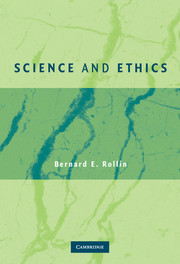Book contents
- Frontmatter
- Contents
- Acknowledgments
- Preface
- 1 The Waxing and Waning of Faith in Science
- 2 Scientific Ideology and “Value Free” Science
- 3 What Is Ethics?
- 4 Ethics and Research on Human Beings
- 5 Animal Research
- 6 Biotechnology and Ethics I: Is Genetic Engineering Intrinsically Wrong?
- 7 Biotechnology and Ethics II: Rampaging Monsters and Suffering Animals
- 8 Biotechnology and Ethics III: Cloning, Xenotransplantation, and Stem Cells
- 9 Pain and Ethics
- 10 Ethics in Science
- Bibliography
- Index
7 - Biotechnology and Ethics II: Rampaging Monsters and Suffering Animals
Published online by Cambridge University Press: 15 December 2009
- Frontmatter
- Contents
- Acknowledgments
- Preface
- 1 The Waxing and Waning of Faith in Science
- 2 Scientific Ideology and “Value Free” Science
- 3 What Is Ethics?
- 4 Ethics and Research on Human Beings
- 5 Animal Research
- 6 Biotechnology and Ethics I: Is Genetic Engineering Intrinsically Wrong?
- 7 Biotechnology and Ethics II: Rampaging Monsters and Suffering Animals
- 8 Biotechnology and Ethics III: Cloning, Xenotransplantation, and Stem Cells
- 9 Pain and Ethics
- 10 Ethics in Science
- Bibliography
- Index
Summary
The statement “There are certain things humans were not meant to know (or do)” often conceals an enthymematic component “because such knowledge will lead to great harm.” This theme is orchestrated in the tales of the Tower of Babel, the Sorcerer's apprentice, the Rabbis who studied the Kabbalah and went mad or turned apostate, and of course the endless variations on the Frankenstein story we alluded to earlier.
The reason that disaster results in these stories, of course, is not so much that a given area of knowledge or its application is inexorably dangerous, it is rather that we (or scientists) tend to rush headlong into a field or activity with incomplete knowledge, where our ignorance inexorably leads to disaster. And we have seen abundant examples of this in twentieth-century science: the escape of “killer” bees, the Chernobyl and Three Mile Island disasters; the various space shuttle tragedies. The thrill inherent in the pursuit of new knowledge or new power often eclipses scientists' concern about dangers – I have seen scientists engrossed in an experiment use their mouths to pipette drug-resistant tuberculosis!
There is in fact a tendency on the part of researchers to denigrate the need for any biosafety oversight; “I've always done it this way and no one has ever been hurt” is a familiar refrain. On one occasion, before it was mandatory for research institutions to have a biosafety officer, I was discussing these issues with the provost of a major research university.
- Type
- Chapter
- Information
- Science and Ethics , pp. 155 - 184Publisher: Cambridge University PressPrint publication year: 2006



